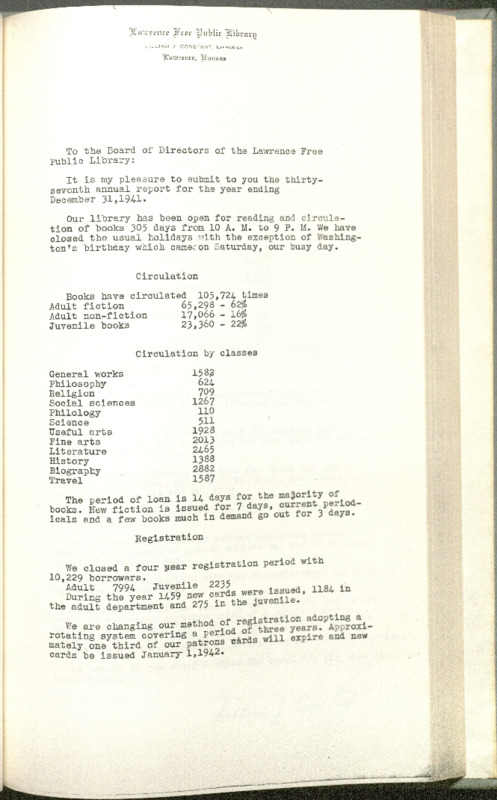Mid-Century Library
With the new space and modernized facilities, the library worked to enlarge the collection and expand its services. As the country dug its way out of the Great Depression and into a new World War, library use once again decreased. But as always...
The library was there to serve the community through war and peace
At the close of 1941, the start of US involvement in WWII, Lillian Constant wrote,
We are ready to undertake anything asked of a public library, whether it is collecting books for soldiers or doing some other defense work. We hope to do our part in keeping up the morale of the community by giving adequate reading service.
Although the people of Lawrence were too busy with wartime conditions to read very much, they still made use of the public library as a place to gather.
In 1941, when the Sunflower Ordnance Works—a munitions factory for manufacturing smokeless powder—opened nearby, hundreds of transient workers found in the library a kind welcome to Lawrence. Lillian Constant's 1942 Annual Report says,
We feel that even though the war has created unusual situations, we have had a profitable year. We have not only collected books for soldiers but have been generous in our service to the transient population brought in by the Sunflower Ordnance Works.
And so the constant librarian saw the library and the people of Lawrence through some of the most difficult times of American history. On June 1, 1947, she retired after 27 years at the library.
Lillian Constant's retirement marked the end of an era
The new head librarian appointed was Ralph van Handel, a WWII veteran and recent graduate of the University of Michigan. In his first annual report in 1947, he wrote,
Miss Constant’s resignation, which took place after 28 years of service, overshadowed all events. It was almost impossible to picture the Public Library without her gracious presence and guiding hand.
The library's transition in leadership also reflected a transition occurring throughout the country, as women in the workplace—indispensible during the war—were replaced with men returning from overseas clothed in victory and in need of fitting employment.
Up until this point, every librarian in Lawrence had been female. The work of these women built the Lawrence Public Library into a formidable institution of learning. But after the appointment of Ralph van Handel, notably a WWII veteran, no woman has since served as head of the Lawrence Public Library.

